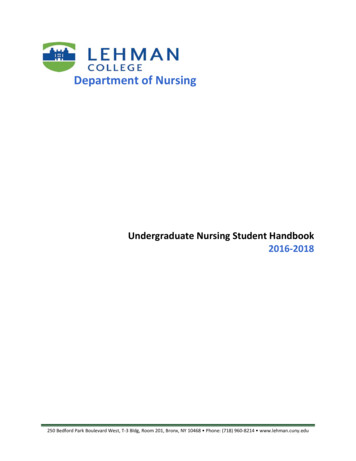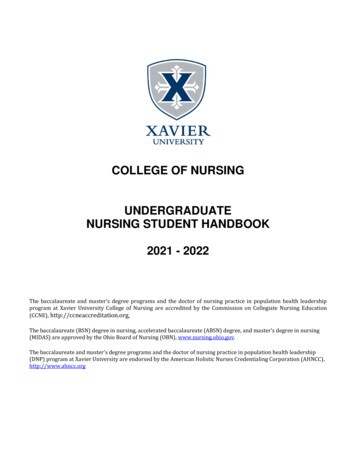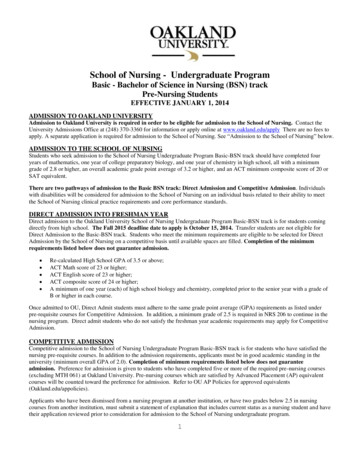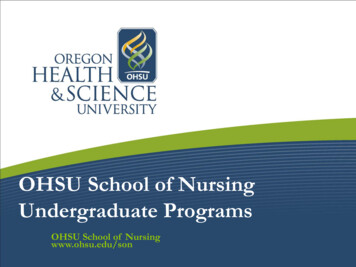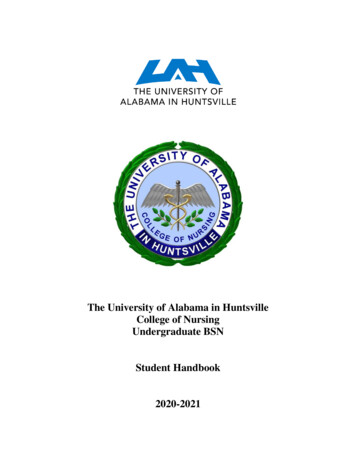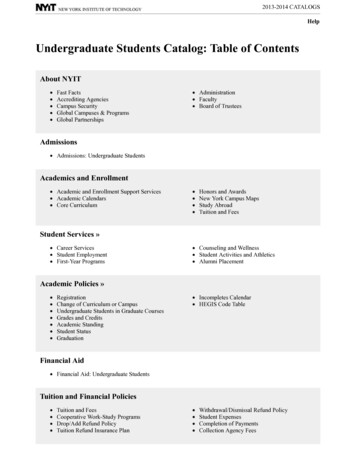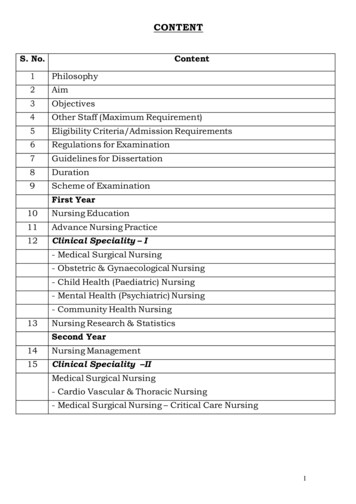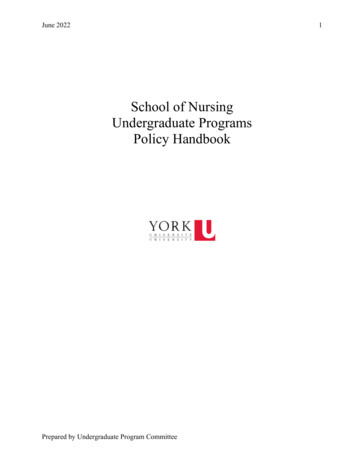
Transcription
June 20221School of NursingUndergraduate ProgramsPolicy HandbookPrepared by Undergraduate Program Committee
June 20222Table of ContentsYork University Policies & Student Documents/Supports . 4Policy: Academic Honesty/Integrity . 4Supportive Student Tools for Academic Honesty: Academic Integrity for Students . 4Code of Student Rights and Responsibilities . 4School of Nursing Undergraduate Supplemental Calendar . 4Academic Policies . 5Policy: Involuntary Withdrawal in a Practicum Course . 5Policy: Length of Completion of York-Seneca-Georgian BScN Program . 7Policy: Length of Completion of 2nd Entry and Post RN Internationally Educated Nurses BScNPrograms . 8Policy: School of Nursing Social Media . 9Policy: Nursing Student Professional Behaviour Policy: A guide to the process within the Schoolof Nursing . 11Policy: Undergraduate Student Leave of Absence Policy . 14Supportive Documents and Policies . 17General SoN Policies/Guidelines . 17Policy: Professional Appearance and Dress Code . 17Relevant School of Nursing Policies . 20Policy: Review and Referral for Undergraduate Nursing Practice Courses . 20Policy: Off Track Requirement to Demonstrate Safe Practice . 22Clinical Practice: Policies Related to Preparing for . 24Clinical Placement Accommodation Guideline . 24Policy: Medication Calculation Testing in Undergraduate Practicum Courses. 26Policy: Out-of-Boundary Student Practicum Placements Within Canada (Practicum &Simulation) . 27Policy: Eligibility Criteria for Requesting a Specialty Area Student Practicum (Practicum SubCommittee of Curriculum Committee) . 27Policies/Information During Clinical Practice. 28Policy: Undergraduate Program Disruption of Practica . 28Policy: Practicum Attendance . 32Guidelines: Epidemic and Pandemic for BScN Students in Practicum Settings . 35Nursing Simulation Centre Policies . 39Policy: Filming in the Nursing Simulation Centre . 39Policy: Safety in the Nursing Simulation Centre . 43Prepared by Undergraduate Program Committee
June 20223Policy: Audio-Visual Recordings in the NSC: Retention and Access . 49Guideline: Nursing Simulation Centre Clinical Course Director Priorities. 51Guideline: Priority Use of the Nursing Simulation Centre . 54Nursing Practicum Coordination Office Documents . 56Incident/Accident Report . 56Student Injury Form (Incident Report – Non Employee) . 56Clinical Preparedness Permit (CPP) . 56GEO Preference Form Sample. 56Student Declaration of Understanding for Students on Program Related Placements . 56HSPNET Disclosure of Student Information Form . 56Prepared by Undergraduate Program Committee
June 20224York University Policies & Student Documents/SupportsPolicy: Academic Honesty/IntegritySupportive Student Tools for Academic Honesty: Academic Integrity for StudentsCode of Student Rights and ResponsibilitiesSchool of Nursing Undergraduate Supplemental CalendarThis supplemental calendar has information for all undergraduate ntent/uploads/sites/402/2022/06/Final SoNSupplemental-Calendar 2022-2023.pdfPrepared by Undergraduate Program Committee
June 20225School of NursingAcademic PoliciesPolicy: Involuntary Withdrawal in a Practicum CourseUPC Review & Approval Date: September 25, 2019Executive Committee Date:Purpose: To identify factors that can lead to an involuntary withdrawal from a practicum settingand the associated processes to be followed.Definitions/Criteria:Involuntary withdrawal is defined as failure in a practicum course prior to the completion of therequired practicum hours component, and/or prior to the end of term. A student may be required towithdraw involuntarily from a course with a practicum component if any of the following aredocumented in the course Practicum Evaluation Tool (PET):a. the student fails to meet the requirements of the course’s practicum component and/or thePracticum Progression Plan, either through unsatisfactory attendance and/or participation inpracticum settings, or through unprofessional and/or unsafe behaviour in fulfilling courserequirements;b. the student’s performance is assessed to disrupt the safe functioning of the practicum site;c. the practicum agency refuses to continue to provide the student with a placement, due to unsafeand/or unprofessional behaviours; and/ord. the student jeopardizes the well-being of clients of the practicum site, and/or demonstrates failureto meet professional standards for practice currently mandated by the College of Nurses of Ontario.The above student behaviours will lead to the decision to withdraw from a course prior to the endof term.Actions:All behaviours must be fully documented using the course PET by the individual who observedthose behaviours; attachments may be included. The academic implications of the observedbehaviours must have been communicated by the Course Director (CD) and the Clinical CourseDirector (CCD) to the student in a timely manner, as part of ongoing feedback in the practicumcourse. Students must receive a copy of the PET.Following a determination by the CD and the CCD that the student has failed a practicum coursebased on an involuntary withdrawal, the Undergraduate Program Director (UPD)/UndergraduateProgram Coordinator (UPC) is notified. An Exploratory Meeting with the student, the CD, theCCD, and the UPD/UPC will be communicated and arranged by the UPD. The student will benotified in this communication that they are being withdrawn involuntarily from the clinical course.The meeting will include a summary of the final clinical performance as documented in the PET,an opportunity for the student to provide their perspective, and to discuss the process of withdrawalfrom the practicum course. This Exploratory Meeting will be minuted and will be kept on thestudent’s file. A copy of the minutes will be provided to the student.Following the review at the Exploratory Meeting, the future progression in the BScN program willbe outlined by the UPD/UPC, typically in a separate meeting. Wherever appropriate, anyrecommended actions will be corrective and educative to support the success of the student inrepeating the course.NOTE:Practicum, or intangible work cannot be reappraised (see Senate information atPrepared by Undergraduate Program Committee
June ls-committee/principles-regarding-grade- reappraisals/).Students who wish to submit a petition for a late withdrawal of a failed clinical course may do sothrough the Faculty of Health’s Office of Student and Academic Services, following the normalprocedures.The UPD/UPC will consult with the Associate Director, Undergraduate Education (ADUE) whenthere are concerns that the nature and seriousness of the student performance issue discussed at theExploratory Meeting could result in possible withdrawal from the BScN program (see the Senatepolicy on s/student- professional-behaviour-policybscn/. The ADUE may initiate a Student Professional Behaviour Review, as per the Senate policy.Other related policies:See redit-policy/. In such an instance, the student will be ineligible to proceed in theprogram.Prepared by Undergraduate Program Committee
June 20227Policy: Length of Completion of York-Seneca-Georgian BScN ProgramApproved by York University Senate January 23, 2014Policy StatementThis policy defines time limitations for program completion for the Collaborative BScN program.Time limitations are important to ensure cohesion and continuity of content, current competenceand associated patient safety within the context of professional nursing education. These timelimitations take into account the program’s collaborative structure and plans of study, the transitionof the BScN student to a second campus, as well as the frequency of course offerings, the length ofcompletion requirements in other York BScN programs, and the degree to which nursingknowledge and practice change over time. Refer to the current Policy for Undergraduate NursingStudent Leave of Absence for other related information.Guidelines1. Length of completion of program1.1. The Collaborative BScN program is a four-year full-time program (eleven terms ). The first twoyears of the program are completed at one of the College partners, and the last two years arecompleted at the School of Nursing at York University. Students normally must complete thisprogram within six (6) calendar years (18 terms) from the time of admission.1.2. Students taking longer than two (2) calendar years to complete the first two program years ofthe Collaborative BScN degree at the College, notwithstanding approved leaves under the Policy forUndergraduate Nursing Student Leave of Absence, will be advised by the relevant College inwriting of the length of time remaining to complete the program prior to transferring to year three ofthe program at York University. Before each new academic session, the Colleges shall notify theSchool of Nursing at York University of any such students.2. Unsuccessful completion of program requirements within the designated timeframe2.1. Students who are unsuccessful in completing the program requirements within the designatedtimeframe, notwithstanding approved leaves under the Policy for Undergraduate Nursing StudentLeave of Absence, must withdraw from their nursing program. If a student is not able to completethe program within the required timeframe, the exit reason will be coded as: “Ineligible to Continueor Graduate”.2.2. Students may apply to be reinstated to the program, in light of extraordinary extenuatingcircumstances, for instance, severe illness or personal loss. Reinstatement may require clinical oracademic remediation including but not limited to repetition of courses, and as per the individualstudent’s standing in the program.2.3. Students who are withdrawn from the Collaborative BScN nursing program on the basis ofexceeding the time limitations for program completion may pursue admission or transfer to anotherdegree program at the University.(1) Undergraduate students may only register within a “session” (i.e., Fall/Winter and Summer) asopposed to a “term”, and exit decisions from a program can only be determined at the end of asession. All exit decisions must be made coincident with the completion of course work in anygiven session. Since nursing students may be concurrently enrolled in courses that both span a fullsession (6 credits) and which are completed in one term (3 credits), discretion regarding the timingof a final decision on student progress and/or exit may be necessary. The School of Nursing willensure registration and exit decisions are communicated to the Registrar's Office for application to astudent's record at the end of the relevant academic session.Prepared by Undergraduate Program Committee
June 20228Policy: Length of Completion of 2nd Entry and Post RN Internationally Educated NursesBScN ProgramsThis policy defines time limitations for program completion for the 2nd Entry and Post RNInternationally Educated Nurses BScN programs. Time limitations are important to ensure cohesionand continuity of content, current competence and associated patient safety within the context ofprofessional nursing education. Please refer to the Policy for Undergraduate Nursing Student Leaveof Absence for other related information.These time limitations take into account the programs’ compressed structures and plans of study, aswell as the frequency of course offerings, and the degree to which nursing knowledge and practicechange over time.Guidelines1. Length of completion of programs The 2nd Entry BScN program is a two-year full-time program (6 consecutive terms).Students normally must complete this program within four (4) years (12 terms) from thetime of admission. The Post-RN Internationally Educated Nurses (IEN) BScN program is a five (5) termfull-time program. Students normally must complete the IEN program within four (4)years (12 terms) from the time of admission.2. Unsuccessful completion of program requirements within the designated timeframe A student who is unsuccessful in completing the program requirements within thedesignated timeframe, notwithstanding approved leaves under the Policy forUndergraduate Nursing Student Leave of Absence, must withdraw from their nursingprogram. If a student is not able to complete the program within the required timeframe,the exit reason will be coded as: “Ineligible to Continue or Graduate”. The student may apply to be reinstated to the program, in light of extraordinaryextenuating circumstances, for instance, severe illness or personal loss. Reinstatementmay require clinical or academic remediation as per the individual student’s standing inthe program. Students who are with withdrawn from a nursing program on the basis of exceeding thetime limitations for program completion may pursue admission or transfer to anotherdegree program at the University.3. Undergraduate students may only register within a “session” (i.e., Fall/Winter and Summer) asopposed to a “term”, and exit decisions from a program can only be determined at the end of asession. All exit decisions must be made coincident with the completion of course work in anygiven session. Since nursing students may be concurrently enrolled in courses that both span afull session (6 credits) and are completed in one term (3 credits), discretion regarding the timingof a final decision on student progress and/or exit may be necessary. The School of Nursing willensure registration and exit decisions are communicated to the Registrar's office for applicationto a student's record at the end of the relevant academic session.Prepared by Undergraduate Program Committee
June 2022Policy: School of Nursing Social MediaRevised and Approved October 26, 2021 by School of Nursing CouncilUPC Review & Approval Date:Executive Committee Date:September 03, 2021September 08, 2021Rationale and Purpose:This policy describes the required social media behaviours to be demonstrated by York nursingstudents in all learning environments. Nursing students are expected to demonstrate a highdegree of professionalism in all forms of electronic-based communication activities.Communication behaviours must be collegial, respectful of diversity and consistent with theYork University Code of Student Conduct and current Canadian information-related standardsrelated to privacy and confidentiality.Responsibility:Nursing students are responsible for adhering to the York University and SON social mediapolicies by behaving in a way that does not harm or threaten to harm another person’s physicalor mental wellbeing (https://oscr.students.yorku.ca/csrr. Students should also demonstratebehaviours that are reflective of the professional standards described in the CNO, C.N.A.documents.In cases of breaches of this policy, each student is expected to assume accountability for theirbehaviour and willingness to accept remedial consequences.CDs & CCDs are responsible for informing students of these behavioural expectations andfollowing up on policy breaches. Actions: York BScN program nursing students are required to adhere to the following: Use respectful language when communicating through videoconferencing, email, phone,text, and social media in general. Students must refrain from posting derogatory or slanderous comments about theUniversity, School of Nursing, faculty, staff, administration, patients/clients and otherstudents on social media. All faculty teaching/learning material is the sole property of the course director.Unless otherwise stated, academic materials such as powerpoint slides, exams,quizzes, tests and course outlines posted on social media will be considered as aviolation of academic honesty es/academic-honesty-senate- policy-on/). Third party copyrighted educational materials such as book chapters, journal articles, orvideos that have been licensed for use in a particular course cannot be copied fordistribution (e.g. uploading to a commercial third party website). This is a violation ofCopyright Law and as such is subject to the York academic honesty policy. York University’s logo cannot be posted on a non-university social media site. Sensitive information is to be respected and students should not share any informationthat is not public knowledge or may result in harm (financial, reputational, physical,legal, regulatory, etc.) to individuals, clinical partner institutions, and/or the University. When using University electronic resources for professional or personal social mediause, student must adhere to University policies and ku.ca/secretariat/policies/policies/computi icy/.Prepared by Undergraduate Program Committee9
June 202210 Student must follow all clinical agency social media policies and expectations duringplacements. Students are not permitted to post patient/client health information (private orconfidential content) on social media sites (i.e., private or public pages). Even if theclient identifiers are removed, posting any client/family related information is prohibited. Images of clients or agencies must not be posted on social media. This is a violation ofprivacy legislation (Personal Health Information Protection Act, 2004)https://www.ontario.ca/laws/statute/04p03. Students must refrain from posting any comments about clinical sites, clients, coworkers, or other students on social media sites or posting audio or video recordingswithout valid written permission from the individual or from the site management. Thisincludes, but is not limited to, comments that are threatening, harassing, profane,obscene, sexually explicit, racially derogatory, homophobic, express personal bias or areotherwise offensive. Accessing agency computers for the purpose of social networking is prohibited.Policy Breach Review Process:The School of Nursing will initiate a professional behaviour review of a potential breach of theSocial Media Policy. The Student Professional Behaviour Review process will be initiated bythe School of Nursing Undergraduate Program Director/Coordinator or designate. The reviewprocess will be guided by the SON Professional Behaviour and the York University StudentCode of Conduct, Rights and Responsibility Policies.The following actions and outcomes include: Determine the type of social media policy breach: academic (e.g. posting test questions)or nursing student professional behaviour breach (e.g. posting patient sensitiveinformation). If a breach has occurred and a review of the York Code of Student Rights andResponsibilities determines that no action is required other than remedial educativemeasures then no official record will be kept. If a breach has occurred that is considered to be severe and warrants the imposition ofconditions on the student program progression, this may include failure in the course orpotential involuntary withdrawal from the program. Initiation of the Professional Behaviour Review process may also occur. In the case of a severe breach, whether it would potentially jeopardize the student’seligibility for CNO registration is considered. No breach has occurred- no permanent records will be retained.ReferencesCollege of Nurses of Ontario. (2019) Code of conduct. Retrieved from: https://www.cno.org/globalassets/docs/prac/49040 code-ofconduct.pdf. AuthorCollege of Nurses of Ontario. (2016). International nurse regulators social media use: Common expectations for nurses. Retrievedfrom: cial-media-use-common- expectations-for-nurses.pdf. Author.College of Nurses of Ontario. (2013). Social media: Reflect before you post. Retrieved from: ines/educational- t/. AuthorYork University. (2017). Academic honesty, Senate policy on. Retrieved licies/academic-honesty-senate-policy- on/York University. (2008). Student professional behaviour policy (BScN). Retrieved ork University Code of Student Conduct Rights and Responsibilities (2021) retrieved from https://oscr.students.yorku.ca/csrrPrepared by Undergraduate Program Committee
June 202211Policy: Nursing Student Professional Behaviour Policy: A guide to the process within theSchool of NursingCommittee Review & Approval Date: November, 2021 SON Council Decision Date: 2022Effective Date: September, 2022Executive Committee Date: December 2021 Evaluation Period: 2 yearsRationale and Purpose:Attaining a Bachelor of Science in Nursing (BScN) degree is an important determinant of eligibilityfor registration with the College of Nurses of Ontario (CNO). Given the professional trajectory ofthe BScN degree, a professional standard of behaviour is expected from nursing studentsthroughout the program. At issue in this policy is the University’s role in graduating competentprofessional nursesThis York School of Nursing (YUSON) policy is situated in a broader York University’scode governing students’ non-academic conduct, The Code of Student Rights &Responsibilities (The Code). The Code identifies the values that students are expectedto uphold in the York University community. The Code upholds a philosophy and practice that areintended to balance a set of principles: support, accountability, and education.Responsibilities:Progression through the BScN program is contingent on students’ behaviour meeting the standardsset out in and other relevantYork University policies including, but not limited to, the Sexual Violence Policy (2019) and theHuman Rights Policies and Procedures, including but not limited to Racism.Students:All students whether personally or through involvement in a student organization areexpected to conduct themselves in a way that promotes an atmosphere of civility, diversity, equityand respect in their interactions with others. (The Code, 2021) Students are also required to befamiliar with and consistently demonstrate the personal, academic and professional behaviouralstandards expected in the Code and the YUSON nursing program policies.Action:A. REQUIRED PROFESSIONAL CONDUCTStudents must:1. Consistently ensure that their personal behaviour meets the standards required by YorkUniversity policies and regulations concerning to student behaviour such as but not limitedto the Code of Student Rights and Responsibilities, as amended from time to time, and theSenate Policy on Academic Honesty;2. Consistently comply with the YUSON policies. The YUSON policies reflect theprofessional expectations expressed in the following professional codes and standards: theCanadian Nurses Association (2017) Code of Ethics, the CNO (2018) Practice Standard:Professional Standards, the CNO (2019a) Practice Standard: Ethics, and the CNO (2019)Code of Conduct.3. Engage in professional behaviour at all times while at York University and in practicumagencies as detailed in the current YUSON Calendar (2021-2022).Prepared by Undergraduate Program Committee
June dar Final.pdf4. dtotheprogramor which was acquiredprior to admission to the Undergraduate Nursing Program but became known only afterhaving been admitted to the Undergraduate Nursing Program. Having a criminal convictionmay jeopardize a student’s ability to gain registration as a registered nurse with the CNO.5. Refrain from engaging in behaviour that impairs the performance of student’s academic andnursing responsibilities.B. JURISDICTIONAllegations of a breach of professional behavioural or ethical standards by a student enrolled in theBScN degree program offered by YUSON shall be addressed by YUSON in accordance with theprocedures outlined below.C. PROCEDURES FOR REVIEW OF STUDENT PROFESSIONAL BEHAVIOURNursing students who violate University rules or public law may be disciplined by theUniversity after an exploratory investigation. Participation in these procedures is afundamental obligation of any student and contributes to enabling the University to actfairly with sufficient information and 2013-2014/policies/student conduct/index.htmAn exploratory investigation occurs to determine: 1) whether a breach has occurred; 2) the type ofbreach and 3) the identification of the appropriate review process.Potential Results of an investigation:1. If no breach is determined, the investigation process gives rise to no permanent record.2. If a breach is determined to have occurred but is found to be low risk, e.g. non- threateningbehaviour, not jeopardizing safety or no physical or psychological harm occurred, theSchool issues a written warning to the student with recommendations for selfdevelopment/learning activities.3. If an issue is determined as high risk, e.g. threatening behaviour, jeopardizing safety of anymembers of the public, the academic community, or a clinical agency, creating physical orphysiological harm, a university level behavioral review is initiated see York University(2021).1. INITIAL REVIEW - WITHIN SCHOOL OF NURSING1. Non-Practicum Courses:If a Course Director (CD) and/or Clinical CourseDirector (CCD) identifies an issue about student behaviour that is not resolved throughdiscussion with the student, the Undergraduate Program Director/Coordinator and/orAssociate Director will be consulted.The Undergraduate Program Director/Coordinator, the Course Director and/or CCD and thestudent will meet to discuss the concerns to determine a resolution. The student may have arepresentative present during this meeting provided this does not unduly delay the meeting.The student also has the option of submitting a written statement in lieu of attending ameeting.If no resolution is achieved or if conditions agreed to by the student as part of the resolutionare not fulfilled, the matter may be referred for a Professional Behaviour Review which isPrepared by Undergraduate Program Committee
June 202213conducted at the Faculty level. /studentprofessional-behaviour- policy-bscn/The Associate Dean, Students may be consulted.Practicum Courses: If a CD and/or CCD and clinical agency presentative identifies abehavioural conduct issue they will follow policies detailed in the School of Nursing’sCalendar.Where the matter concerns the possible outcome of denying the student an opportunity tocomplete the Practicum requirement, the matter may be referred for a
Undergraduate Nursing Student Leave of Absence, will be advised by the relevant College in writing of the length of time remaining to complete the program prior to transferring to year three of the program at York University. Before each new academic session, the Colleges shall notify the School of Nursing at York University of any such .

